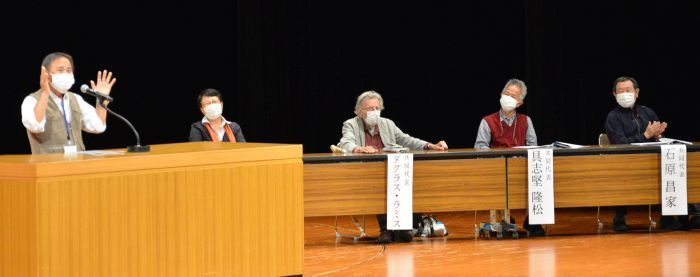“Don’t make Okinawa a battlefield again” The No More Okinawan War, Life is a Treasure committee warns of the danger of militarization in their inaugural conference

The joint representatives of the “No More Okinawan War, Life is a Treasure” committee, which is calling for the prevention of war coming to Okinawa again: (from the left) Hiroji Yamashiro, Harumi Miyagi, Douglas Lummis, Takamatsu Gushiken, and Masaie Ishihara – March 19, Okinawa Civic City Center
March 20, 2022 Ryukyu Shimpo
By Masanao Chinen
The “No More Okinawan War, Life is a Treasure” committee, which aims to prevent Okinawa from again becoming a stage for warfare, held their inaugural meeting on March 19 at the Okinawa City Civic Center. The group is aligned on the belief in the dangers of the continued deployment of Japanese Self-Defense Forces and missile corps to Okinawa’s southwestern archipelago. In a written resolution the group adopted, they call for Okinawan’s who believe that Okinawa should never again become a theater of war to gather, and to appeal to the governments of Japan, the U.S., China, and Taiwan, as well as public opinion, to oppose war under the pretext of the situations in Taiwan and the Senkaku islands.
According to the organizer, there were 607 participants including those who joined online. The group has 1,265 members.
The written resolution criticizes the Ministry of Defense’s position of leaving the evacuation of civilians in an emergency to municipal governments saying, “We were already forced to learn the lesson in the Battle of Okinawa that armies do not protect people, armies cause people to die.”
Joint representative Hiroji Yamashiro met with Okinawa Governor Denny Tamaki on March 22, where he explained the written resolution as well as the groups founding principles. He also reported that the group has supporters in Kagoshima and Uruma City.
Harumi Miyagi (an Okinawan women’s history researcher), another joint representative, said that she hopes, “[future generations] won’t be asking us why we didn’t oppose war in our time.”
Takamatsu Gushiken, who helps recover the remains of those who died in the war, asked “Why is it that if the US and China goes to war, Japan has to participate? Why does Okinawa have to be the stage on which that war happens?” He highlighted the lack of the strict suppression of free speech that existed during the Pacific War, stating, “Now, we are free to speak freely. If we don’t want to be embroiled in war, we need to speak up.”
Former U.S. marine and international political scholar Douglas Lummis indicated that in war military bases become a target of attack and that, “[the opposition country] has the right under international law to respond in kind. Tragically, the Okinawan people [that will be enveloped in war] do not approve of the war, permit the war to happen, or pursue the war themselves. Many people who are not involved in the war in any way will die.”
In a keynote speech given by Ryukyu Shimpo editorial board journalism director Tsuyoshi Arakaki indicated that there is an “increasing governmental emphasis on the Japanese-American alliance,” that has no qualms about making civilians victims in order to maintain the Japan-U.S. defense structure, and that he is concerned that Okinawa will again be the “sacrificial stone toss” to maintain that national polity.
He also touched on the Regional Comprehensive Economic Partnership (RCEP), which is joined by 15 countries including Japan, China, Korea, and the Association of Southeast Asian Nations (ASEAN), saying “While the increasingly tight-knit economic are being developed, security should be the next topic to tackle, and we should be building a framework to extinguish the sparks of conflict in Asia before they can ignite.”
(English translation by T&CT and Sam Grieb)
Previous Article:In workation study, OPG finds that sleep and concentration improve when working in Okinawa
Next Article:World’s first shark embryo incubated in artificial uterine fluid until birth is on display at Churaumi Aquarium
[Similar Articles]
- 181 environmental groups support governor Onaga’s revocation of Henoko approval
- EVA Airways plans to launch flights between Naha and Taipei in mid-June
- Naha City Assembly resolves to protest against alleged rape by US sailor
- Intellectuals in Okinawa assert that the Senkaku Islands should be shared
- Okinawa assembly seeks peaceful resolution to the Senkaku issue
 Webcam(Kokusai Street)
Webcam(Kokusai Street)


